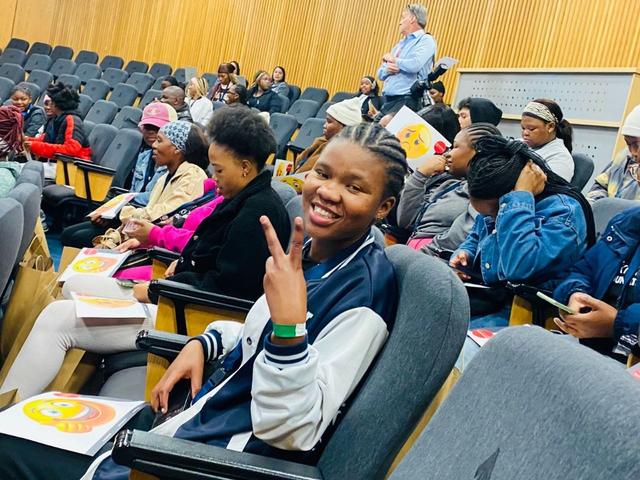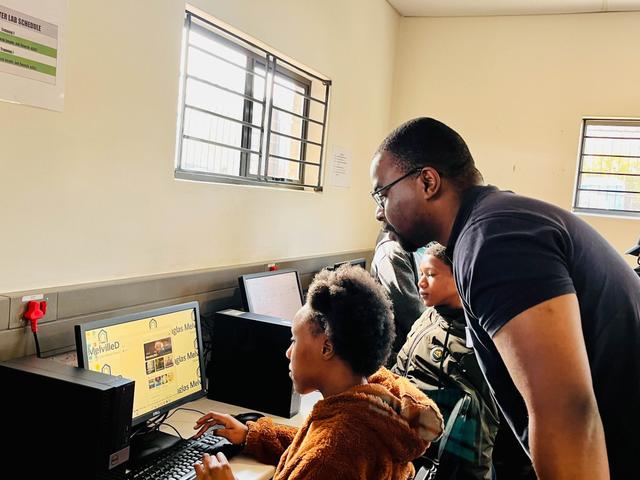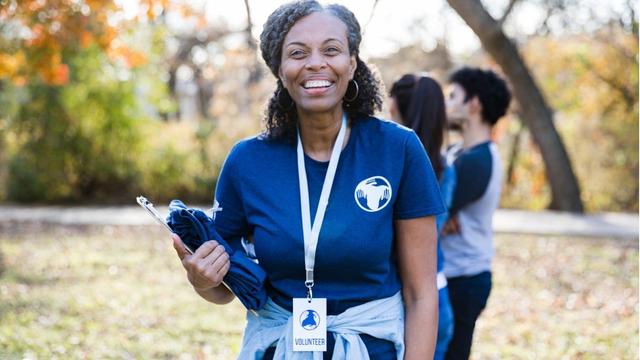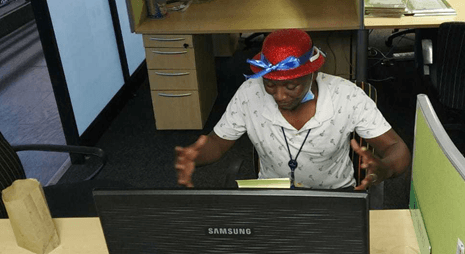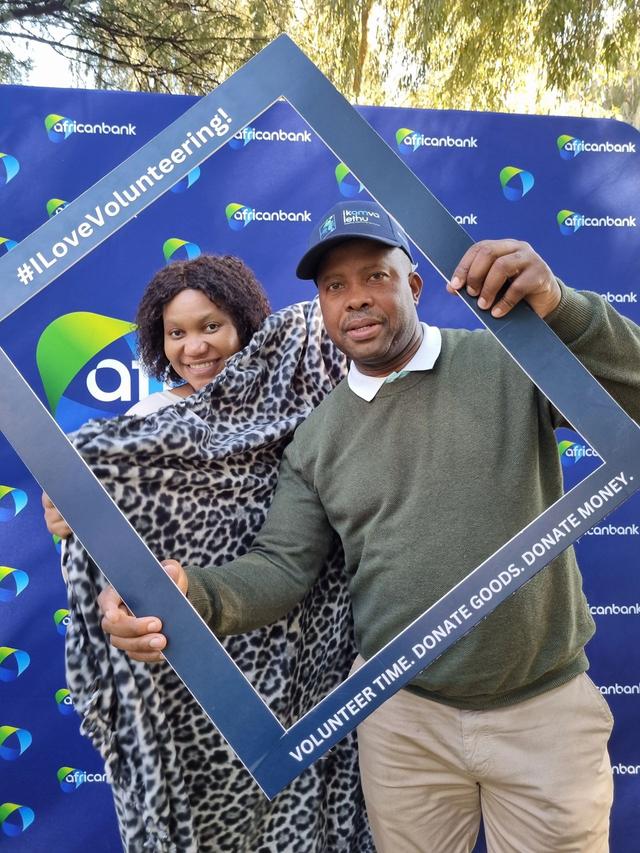![[WEBINAR] Leveraging skills-based employee volunteering to amplify CSI](/_next/image?url=https%3A%2F%2Fcdn.sanity.io%2Fimages%2Fxquleem7%2Fproduction%2Fd64d551fd490d43a6dd186f3df8edd38aa084a18-1270x710.png&w=640&q=75)
- Home
- Information Centre
- Webinar Leveraging Skills Based Employee Volunteering To Amplify Csi
[WEBINAR] Leveraging skills-based employee volunteering to amplify CSI
Many large South African companies run employee volunteering programmes (EVPs), with research showing that employees are proud to work for organisations committed to social and environmental development.
Yet participation in volunteering tends to drop once the Mandela Day hype dies down – precisely when sustained engagement could create the most profound change.
In July, to commemorate Mandela Month, Trialogue and the FirstRand Foundation hosted a webinar examining how skills-based volunteering allows employees to use their professional skills to support nonprofit organisations. This creates the potential for sustained outcomes if skills are effectively transferred from the company to the nonprofit.
The webinar panelists were Desiree Storey (Manager: FirstRand Volunteers Programme at the FirstRand Foundation), Rufaro Mudimu (Strategic Advisor at enke: Make Your Mark), and Mashadi Letwaba (Director of Business Development at forgood).
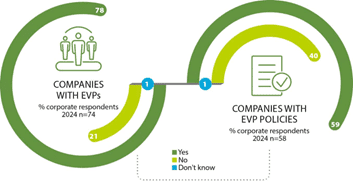
Over three-quarters (78%) of large South African companies have established EVPs, with 80% now having dedicated staff to manage the programmes (up from 65% in 2023).
Companies are increasingly professionalising their approach, with 59% having stated EVP policies and 63% maintaining separate budgets for volunteering initiatives.
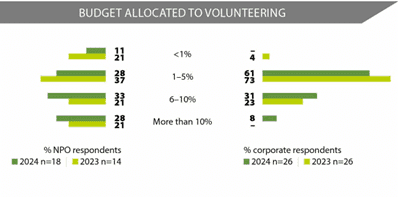
Most companies (61%) allocate between 1% and 5% of their CSI budgets to EVPs, with an average allocation of 6%.
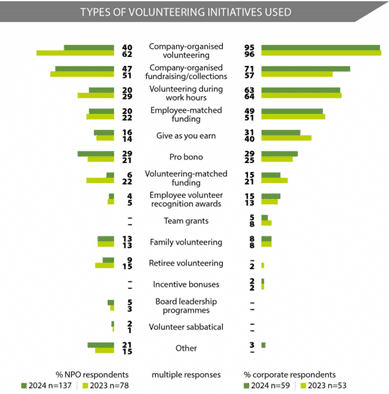
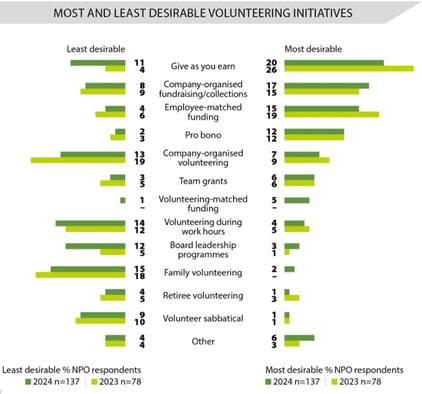
There tends to be a misalignment between corporate preference and nonprofit needs. Pro bono support remains highly sought after, underscoring the value of thoughtful, planned volunteering.
FirstRand’s approach to employee volunteering
Desiree Storey indicated that the FirstRand Foundation’s employee volunteering programme (EVP) was launched in 2002 and has evolved over the years. The EVP focuses on “action with purpose” and is structured around three main pillars:
- Cause-related volunteering (FirstRand matches time and money donated to employees’ chosen causes, provided these organisations are registered on FirstRand’s volunteering platform).
- Skills-based volunteering (various initiatives – see below).
- Volunteering via the FirstRand Empowerment Foundation and the FirstRand Foundation (employees can volunteer time and skills for organisations funded or supported by these two entities). Incentivised group-themed volunteer initiatives also fall under this pillar, for example, FirstRand’s education drive, which is aligned with FirstRand’s quality education pillar across both foundations. FirstRand has supported 50 schools in 2025 and assisted people with disabilities, helping 40 organisations in the same year.
The recently launched Move It For Good campaign, rolled out over three months four times a year, has supported people with physical and mental disabilities, climate change initiatives, and youth empowerment efforts thus far in 2025. Employee donations are matched.
During Mandela Month, FirstRand partnered with Meals on Wheels, with 1 500 employees packing 1 000 food parcels and creating 750 garden planters for early childhood development centres, schools and old-age homes supported through the EVP (all provinces in South Africa benefit from programmes).
Storey indicated that the FirstRand Foundation will shortly be launching a CEO Volunteering Accelerator, which will entail 26 teams of employees undertaking a comprehensive 12-month immersion with registered nonprofits. The idea is to contribute skills that will assist nonprofits to take their work on social or community challenges to the next level.
FirstRand’s skills-based volunteering programmes
FirstRand partners with youth leadership development organisation enke: Make Your Mark on programmes to ready young South Africans for the workplace. This co-partnership is a value exchange that works both ways, noted Rufaro Mudimu.
The programmes – the FirstJob Initiative, which places unemployed graduates in internships at FirstRand, and the Bursar Mentorship Programme, which focuses on second-year undergraduate bursars funded by the FirstRand Foundation – are one-year journeys with transformative potential. Young people are exposed to soft skills and guidance on basics such as compiling their CVs and networking skills to help them thrive in their future careers.
FirstRand employees serve as mentors, sharing their skills and experience with young mentees who aim to enhance their confidence and employability. Interns not retained by FirstRand are tracked for an additional six months to determine whether they have found employment or not.
How forgood facilitates skills-based volunteering
forgood – Africa’s largest volunteering platform – facilitates connections between companies and nonprofits, involving the donation of money, goods and time. To date, it has facilitated around 100 000 connections. “We have found that 90% of giving across our platform is time,” said Mashadi Letwaba.
forgood hosts onboarding sessions with corporate volunteers to understand the company culture, how volunteers work, and what time constraints they have. It also collaborates with approximately 500 vetted nonprofits to understand the scope of work required to meet their needs, whether they are ready for volunteers, and whether the volunteering should be in-person or remote.
“It’s easier to match organisations once we have all this information,” she explained, adding that employees tend to be more interested in long-term involvement than ‘voluntourism’.
Letwaba said one of the challenges is matching the right volunteer to the right organisation, which is “where the gold lies and where technology has been crucial”.
One of the challenges is access to the “right” skills to assist nonprofits in scaling and becoming sustainable, and forgood tries to close the gap through its strategic programmes and campaigns. With around 33 000 employees registered, there is a deep talent pool – but it is crucial to understand what nonprofits need, and what the communities they serve require.
“No two communities or townships are the same in South Africa. The Vaal is different to Soweto,” noted Letwaba, adding that it is important to understand their pain points.
A snap poll held during the webinar indicated that most nonprofit attendees require assistance with monitoring, evaluation and impact measurement systems – something requiring expertise that not all nonprofits can embed within their organisations.
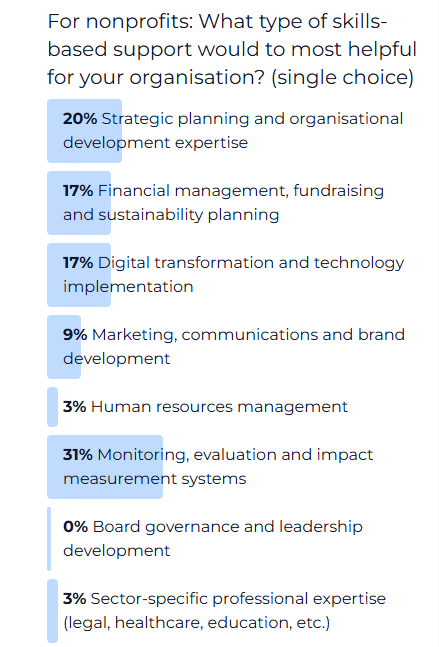
Guidance for companies and nonprofits
Both Storey and Mudimu stressed the importance of intentionality when it comes to EVPs.
“Programmes must be meaningful for both the volunteers and the nonprofits,” Mudimu said. For her, “building trust and being vulnerable about the gaps” are critical – and it’s essential to acknowledge the contributions of volunteers. “Thank you goes a long way – and it doesn’t have to be fancy,” she pointed out.
For Letwaba, Mandela Day events and similar initiatives remain essential, as they complement skills-based programmes well. She makes reference to forgood’s ‘Marry your volunteers’ philosophy on how corporates can make the shift from one-day events to getting committed volunteers over time programmes. “One-day events are crowd pullers – we get a huge number of registrations, excitement and collaboration – but it’s possible to move from a one-day career day to building on the momentum by encouraging volunteers to mentor graduates,” she noted. “There are different ways to keep up the momentum, and no one-size-fits-all approach will work, as company cultures differ.”
At the final stage – “the wedding, where you get the ring” – is to use storytelling to emphasise impact and recognise your volunteers. “We have seen around 170 000 beneficiaries impacted; it helps if people can understand how their skills and contributions have changed lives,” she said. Once you have a committed volunteer base, the next step is to identify and cultivate ambassadors and champions who can motivate other volunteers to do more.
Letwaba urged companies to shift their mindsets and view employee volunteering not as charity work but as professional development that benefits communities. “It’s an opportunity for employees to grow professionally while making a social impact,” she noted. “When this happens, participation soars and so does the bottom line of the business. The future of volunteering is skills-based, strategic and sustainable, making for a stronger, more engaged workforce.”
Storey concluded by recommending that companies allow their employees not only to leverage their skills but also to innovate, and suggested that CEOs make themselves available so that employees can learn from their expertise. She also stressed the enduring importance of monitoring, evaluation and learning (MEL), including setting it up before rolling out programmes.
Watch the full webinar
Click HERE to watch the full webinar.
For more information please contact Mashadi on contact@forgood.co.za.
